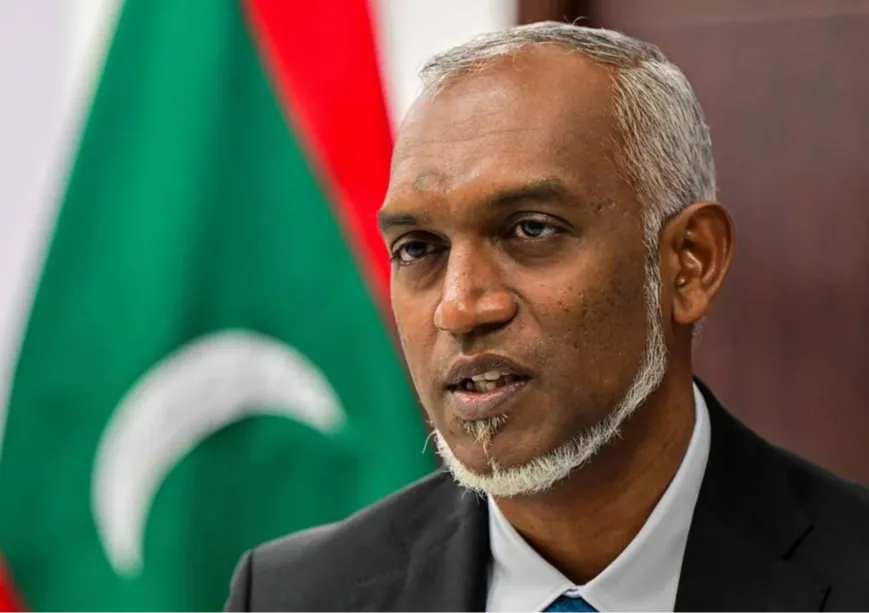
A special Majilis (Parliament) session to approve President Mohamed Muizzu’s cabinet has triggered a political storm in the Maldives. The session quickly escalated into a brawl, with parliamentarians exchanging blows as the Opposition—the Maldivian Democratic Party (MDP) and the Democrats decided to reject three ministers from Muizzu’s Cabinet. Following the event, the Opposition has agreed to introduce an impeachment motion against Muizzu, blaming him for the altercation. On the other hand, Muizzu has re-appointed the very same ministers rejected by the Majilis. The recent development underscores the persistent tussle between the country’s legislative and executive since its democratic transition in 2008—which is even likely to exacerbate following the upcoming parliamentary elections in March.
A persistent struggle
In 2008, Maldives embraced a multi-party system. The new system was supposed to ensure that the Parliament maintains checks and balances against the executive led by an elected President. However, the transition contributed to a consistent struggle between both bodies, mostly to settle political scores due to the country’s fragile and polarised political landscape. As a result, the government and the Opposition have consistently attempted to control the Parliament, knowing that their fate is related to securing a majority.
The new system was supposed to ensure that the Parliament maintains checks and balances against the executive led by an elected President.
In 2008, Mohamed Nasheed of the MDP was elected as the president, but his party failed to secure a simple majority in the parliamentary elections in 2009. The MDP, with just 26 out of 77 parliamentary seats, was overshadowed by the Opposition coalition's 35 seats. The subsequent years witnessed the Opposition problematise and politicise most of the government's policies. They rejected several ministers and passed laws that mandated parliamentary approval on multiple issues. This had caused a tussle between the government and the Parliament, even contributing to the arrest of the Opposition leaders. While the Opposition did not enjoy the numbers to impeach the President, they managed to gather enough support to oust Nasheed by compelling him to resign in 2012.
In the following presidential elections (2013), Abdulla Yameen of the Progressive Party of Maldives (PPM) won the presidential elections. Learning from the experiences of the previous government, Yameen tried to have a favourable number in the Parliament—both through alliances and by encouraging defections. In the 2014 parliamentary elections, PPM secured 33 out of 85 seats, and their allies the Jumhooree Party (JP) and Maldives Development Alliance (MDA) secured 15 and 5 seats each—giving them a majority in the Parliament. By 2017, Yameen increased his own party’s strength to 47 seats.
Learning from the experiences of the previous government, Yameen tried to have a favourable number in the Parliament—both through alliances and by encouraging defections.
On the other hand, the MDP with 26 seats, scrutinised the government and continued to ally and woo other MPs to cooperate with them. They proposed a no-confidence motion against the speaker nearly four times from 2017-2018, while the government responded by disqualifying rebel MPs and using security forces to evict Opposition MPs from the Parliament. Finally, as the opposition mustered enough numbers to impeach Yameen, the latter imposed an emergency. Yameen was subsequently ousted through elections in 2018. It was only after his defeat in 2018 and the parliamentary elections in 2019 that the MDP was able to dominate both the legislature and the executive.
Muizzu’s number game
The victory of PPM-People’s National Congress (PNC) candidate—Mohamed Muizzu has altered this equilibrium again. As Muizzu swore in, six MPs from his party and another MP from the partner Maldives National Party (MNP) resigned to take cabinet positions. As a result, the PPM-PNC had just four MPs in the Parliament, and its coalition partners—the MNP and the MDA had two MPs each. Overall, the ruling coalition and their allies had support from only 8 of the 87 MPs in the Parliament. In contrast, the Opposition—MDP had 56 MPs, and the Democrats had 13 MPs. The JP and independents also had two MPs each.
Leveraging their strength, the MDP and the Democrats had threatened to impeach the president and reject their ministers on multiple occasions. They amended rules on the impeachment process of the President and Vice president by reducing the number of MPs required for the procedure since the parliament strength was reduced to 80, following the seven resignations. They also pushed for individual approval of ministers rather than a blanket approval of the cabinet.
Leveraging their strength, the MDP and the Democrats had threatened to impeach the president and reject their ministers on multiple occasions.
To ensure his survival, in late December, Muizzu managed to woo 14 MPs (13 from MDP and one independent candidate) to join their side. While this increased their strength (Table 1) and weakened the possibility of being easily impeached, the threat still persists. The Democrats and the MDP together have more numbers (56) to impeach the president than the minimum required (54).
Table 1. The current composition of the Maldives’ Majlis (Parliament)
| Parties |
Composition |
| MDP |
43 |
| JP |
02 |
| PPM |
02 |
| PNC |
15 |
| MDA |
02 |
| Independent |
03 (02 from MNP) |
| Democrats |
13 |
| Total |
80 |
Source: Avas, Sun
Muizzu Out?
Both MDP and the Democrats also expressed their unhappiness with the government’s regulation of state-owned enterprises, increasing the Parliament size, political favouritism and appointments, pro-China and anti-India tilt, and opaqueness on expenditure, financial status, and agreements with countries. The Opposition also rejected three of Muizzu’s cabinet ministers to discipline the government. However, the PPM-PNC’s instigation of violence and protesting outside the Parliament has indicated signs of democratic backsliding and has firmed the opposition’s position on impeaching the president.
But Muizzu is likely to survive this impeachment motion. As history illustrates, the administration will use all its executive power to avoid the impeachment process. The government has already filed a case in the Supreme Court questioning the legitimacy of the recent amendments to the impeachment process. A stay order from the court might even put an abrupt end to the impeachment process, especially when the Parliament is about to end its term.
The government has already filed a case in the Supreme Court questioning the legitimacy of the recent amendments to the impeachment process.
Politically, the Opposition MPs seem to be varying on the issue too. This division was more visible with their voting patterns against Muizzu’s cabinet, in which some defied the party’s three-whip line. The impeachment might even fail if Muizzu gets more than two opposition MPs to join him or even oppose the motion. His parties—PPM-PNC, allies MDA and MNP—and the JP have already indicated their support to protect Muizzu against impeachment.
Way ahead:
Regardless of the outcome, the calls for impeachment themselves underscore broader structural issues awaiting Muizzu, following the parliamentary elections. A simple majority cannot guarantee certainty to his governance, given the lack of anti-defection law and the country’s history of defecting MPs. As a result, the government hopes to secure a supermajority of around 62 seats. But this would be a challenge for the government:
Primarily, the government has failed to build a broader coalition and is even reluctant to share power. Its partners- MDA has no political appointment or position in the government, and the MNP has just one crucial appointment. The JP has continued to indicate neutrality. And despite initial possibilities of allying with the Democrats, the PPM-PNC alienated them by declining to accommodate them in crucial government portfolios. To complicate matters - the government’s recent policies and activities have even nudged the Democrats closer to the MDP.
Muizzu’s efforts to empower his loyalists and alienate Yameen's supporters have also pushed several PPM-PNC supporters away from the ruling party.
On the other hand, Muizzu’s sidelining and subsequent ousting of Yameen from PPM-PNC will have political costs too. It is no coincidence that Yameen, who feels betrayed, has reportedly supported the calls for impeachment against Muizzu. Yameen’s party—People’s National Front (PNF) is also keen to split the voter base by contesting against Muizzu in the upcoming parliamentary elections. Muizzu’s efforts to empower his loyalists and alienate Yameen's supporters have also pushed several PPM-PNC supporters away from the ruling party.
Muizzu’s nonchalant administration and inability to share power with other leaders and parties might limit him from securing a significant majority in the Parliament. Further, with parties like the Democrats, MDP, and PNF taking an open stance against Muizzu, the new Parliament will continue to contribute to the ongoing struggle between the Parliament and the President, paving the way for more uncertainty and instability.
Aditya Gowdara Shivamurthy is an Associate Fellow with the Strategic Studies Programme at the Observer Research Foundation
The views expressed above belong to the author(s). ORF research and analyses now available on Telegram! Click here to access our curated content — blogs, longforms and interviews.




 PREV
PREV


